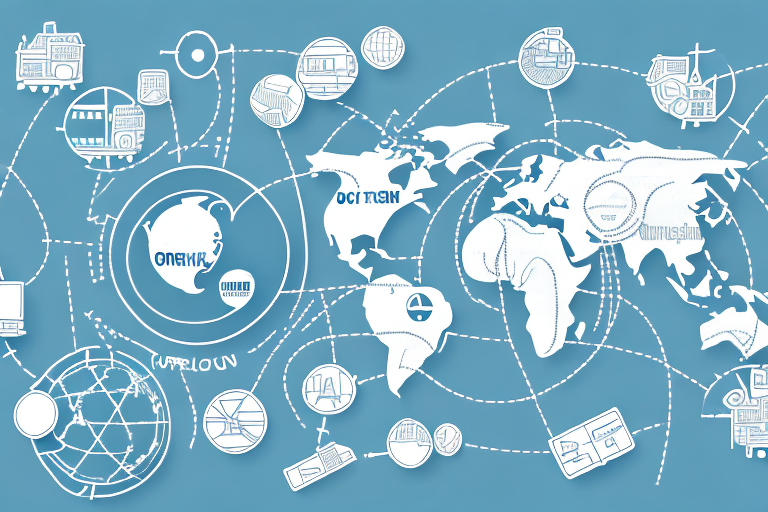Navigating the Complexities of UPS Customs Brokerage
If you’re involved in international trade, you’ve likely heard of customs brokerage and perhaps even engaged the services of a customs broker. However, when it comes to shipping with UPS, there are unique aspects of UPS’s customs brokerage service that are essential to understand in detail. In this article, we’ll dive into the intricacies of UPS customs brokerage, including its importance, operational mechanisms, and strategies your business can employ to effectively navigate the complexities of customs regulations and requirements.
What is UPS Customs Brokerage and How Does It Work?
Customs brokerage involves navigating the intricate regulations and requirements associated with shipping goods internationally. When shipping with UPS, customs brokerage entails utilizing the services of a licensed customs broker to bridge the gap between your business and customs authorities.
Using UPS customs brokerage, a dedicated customs broker manages the process of clearing your shipment through customs, ensuring all necessary documentation and fees are in order. This includes handling any taxes or duties that may be levied on your shipment and liaising with customs officials to resolve any arising issues.
One significant advantage of using UPS customs brokerage is the integration with the UPS platform you already use to create and manage your shipments. This integration allows real-time tracking of your shipments and monitoring the status of customs clearance without the need to manually interact with customs authorities.
Additionally, UPS customs brokers provide guidance on accurately classifying your goods for customs purposes, reducing the risk of shipment delays or rejections due to incorrect classifications. Proper classification can prevent additional fees and minimize lost time.
Moreover, UPS customs brokerage offers support for special circumstances, such as shipments requiring permits or licenses, or goods subject to additional regulations or restrictions. The customs broker assists in navigating these requirements, ensuring compliance with all applicable laws and regulations.
The Importance of Customs Brokerage in International Trade
Customs brokerage is pivotal in ensuring that international trade operates smoothly and efficiently. Without a customs broker, businesses face the daunting task of navigating a complex web of customs regulations and requirements, which can significantly delay shipments, increase costs, and jeopardize international relationships.
Partnering with a customs broker streamlines the customs clearance process, ensuring that shipments comply with all necessary regulations and that fees or duties are accurately and promptly paid. This partnership helps mitigate the risk of customs-related delays, reduces costs, and maintains the efficiency of your international shipping operations.
Customs brokers possess expertise in the ever-evolving landscape of international trade regulations, which can vary significantly from country to country. Staying abreast of these changes is a challenging and time-consuming endeavor. A customs broker ensures that your shipments remain compliant with the latest regulations, eliminating the need for your business to continually monitor regulatory updates.
Furthermore, customs brokers offer valuable advice and guidance on a range of international trade issues, including tariff classifications and trade agreements. Leveraging their knowledge and experience aids in making informed decisions about your international trade operations, thereby avoiding costly mistakes that could negatively impact your bottom line.
Understanding the Role of a Customs Broker in the Shipping Process
A customs broker serves as an intermediary between your business and customs authorities, ensuring that your shipments meet all necessary regulations and requirements for swift and smooth customs clearance.
Specifically, a customs broker will help you:
- Complete and file all necessary customs documents and declarations
- Determine the correct classification for your goods to ensure appropriate fees and taxes are assessed
- Communicate with customs officials to resolve any issues or disputes that may arise
- Act as your representative in all customs-related matters
Overall, a customs broker acts as an expert guide through the complex and ever-changing world of customs regulations and requirements, allowing you to focus on your core business activities.
Common Challenges Faced When Dealing with Customs Regulations
While customs brokerage aids in streamlining the customs clearance process, businesses still encounter several common challenges when shipping goods internationally. Some of the most prevalent challenges include:
- Difficulties in calculating appropriate fees and taxes
- Delays in customs processing that can slow down shipments
- Confusing or complex customs regulations that are challenging to navigate
- Inconsistent application of customs regulations across different countries or regions
- Unexpected changes to customs regulations that can disrupt established shipping processes
To successfully navigate these challenges, it’s crucial to work with a customs broker who possesses deep expertise in your specific industry and the countries you are shipping to and from. This expertise ensures that your shipments are compliant, efficient, and cost-effective, regardless of any challenges that may arise.
Tips for Choosing the Right Customs Broker for Your Business Needs
Selecting the right customs broker is a critical decision for your business. Not all customs brokers offer the same level of service, and choosing the wrong partner can lead to delays, increased costs, and even legal penalties. Here are several tips to help you choose the right customs broker for your business’s needs:
- Choose a broker with extensive expertise in your specific industry and the countries you are shipping to and from
- Ensure the broker has strong relationships with customs officials and other regulatory bodies
- Consider the broker’s size and resources—larger brokers may have more capacity to handle complex shipments
- Read customer reviews and testimonials to assess past performance
- Verify the broker’s licensing and certifications to ensure they are qualified to handle your shipments
By investing time in carefully selecting the right customs broker, you can enhance the success of your international shipping operations and avoid costly delays or penalties.
How to Prepare Your Shipment for Customs Clearance and Inspection
In addition to selecting the right customs broker, taking proactive steps to prepare your shipments can facilitate successful customs clearance and inspection. These steps include:
- Double-checking your paperwork: Ensure that all required documentation is complete and accurate to prevent delays.
- Properly labeling your goods: Include necessary descriptions, values, and classifications to comply with customs requirements.
- Ensuring all required fees and taxes are paid: Prepaying fees can expedite the clearance process.
- Providing necessary permits or licenses: Supply any required documentation for regulated goods or materials.
By implementing these proactive measures, you can expedite the customs clearance process, reduce the risk of delays, and maintain the efficiency of your international shipping operations.
The Benefits of Streamlining Your Customs Clearance Process with UPS
Utilizing UPS customs brokerage allows you to streamline the customs clearance process and enjoy several key benefits for your business, including:
- Reduced risk of customs-related delays
- Increased efficiency and cost savings in your shipping operations
- Improved tracking and visibility into the status of your shipments
- Expert guidance and support from licensed customs brokers
- Access to a wide range of additional shipping and logistics services through UPS
Overall, using UPS customs brokerage enables your business to focus on core activities while entrusting the complexities of customs clearance and regulation to the experts.
Common Mistakes to Avoid When Using UPS Customs Brokerage Services
While there are numerous benefits to using UPS customs brokerage, businesses should be mindful of common mistakes that can undermine these advantages. These mistakes include:
- Providing inaccurate or incomplete information: Ensure all customs documents are accurate and complete to avoid delays.
- Failing to pay all required fees and duties in advance: Prepayment helps prevent shipment hold-ups.
- Improperly classifying goods: Incorrect classifications can lead to excess fees or penalties.
- Neglecting to regularly check shipment status: Monitoring shipments allows for the anticipation and resolution of potential delays or issues.
By meticulously reviewing documentation and fees, accurately classifying goods, and closely monitoring shipments, you can minimize the risk of these common mistakes and ensure a successful customs clearance process.
How UPS Can Help Your Business Navigate Changing Customs Regulations
One of the primary challenges of customs brokerage is the frequent and sometimes unexpected changes in customs regulations and requirements, which can complicate compliance. By partnering with a customs broker like UPS, your business can stay ahead of these changes and ensure adherence to the latest regulations.
UPS possesses extensive experience and knowledge in managing customs brokerage for businesses of all sizes and industries. We collaborate with businesses to stay informed about regulatory changes and help them navigate the complexities of customs clearance smoothly and efficiently.
For more detailed insights into current customs regulations and trends, refer to [UPS's Customs Resources](https://www.shipscience.com/customs-resources).
Best Practices for Efficiently Managing Your Customs Paperwork and Documents
Efficient management of customs paperwork and documents is crucial for successful customs brokerage. Implementing the following best practices can enhance your documentation process:
- Create a standard checklist: Develop a checklist of required documents for each shipment to ensure completeness.
- Ensure documentation accuracy: Verify that all paperwork is complete and accurate before shipment.
- Maintain detailed records: Keep comprehensive records of all customs-related paperwork and communications for reference and compliance.
- Leverage technology: Utilize software and digital tools to streamline document preparation and submission, reducing the likelihood of errors.
Adhering to these best practices helps minimize the risk of delays and errors in customs clearance, ensuring that your international shipments proceed without unnecessary hindrances.
Cost Considerations: What You Need to Know About Fees and Duties with UPS Customs Brokerage Services
One of the most common questions businesses have regarding customs brokerage is related to costs. Fees and duties can vary widely based on several factors, including the country of origin and destination, the value and type of goods being shipped, and the specific services provided by the customs broker.
However, the advantages of using customs brokerage often significantly outweigh the costs, especially when it comes to ensuring the successful and timely delivery of your shipments. By partnering with a customs broker like UPS, you gain the assurance that your shipments are managed by experts, while also benefiting from more efficient and streamlined customs clearance processes.
For a detailed breakdown of UPS customs brokerage fees and services, visit the [UPS Customs Brokerage Pricing](https://www.shipscience.com/customs-brokerage-pricing) page.
Conclusion
Navigating the complexities of customs clearance is a formidable task for businesses engaged in international trade. However, collaborating with a licensed customs broker like UPS can streamline the process, mitigate the risk of delays and penalties, and ensure that your shipments reach their destinations swiftly and efficiently.
By comprehensively understanding the role of customs brokerage in international trade, selecting the right customs broker, and adhering to best practices for managing customs paperwork and documents, your business can adeptly navigate the intricate world of customs regulations and requirements, fostering seamless and profitable international operations.






















